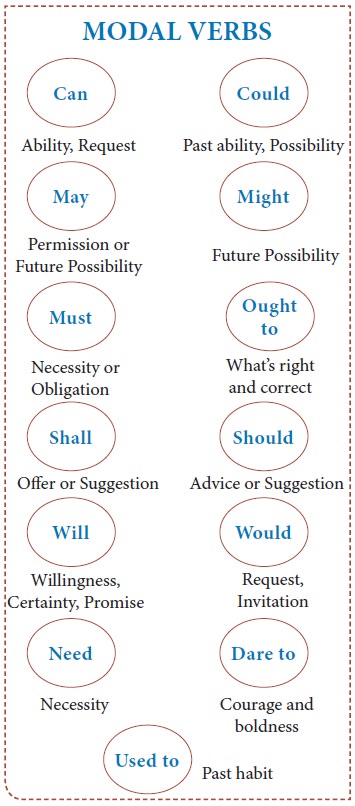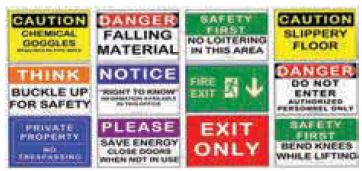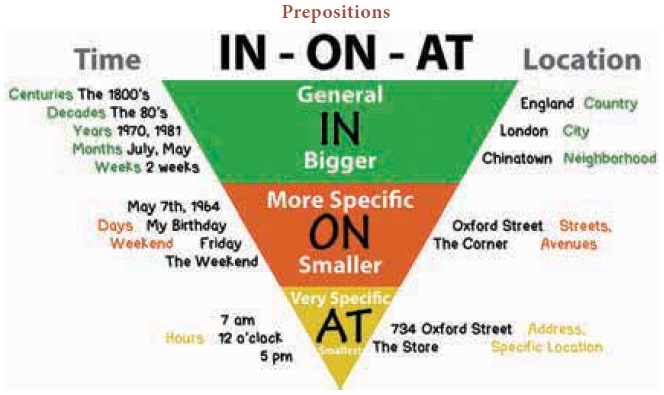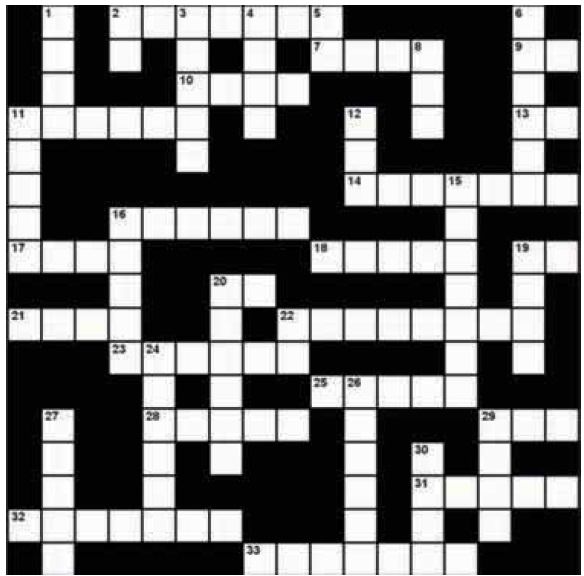Modal Auxiliaries, preposition - The Queen of Boxing: Grammar | 11th English : UNIT 2 : Prose: The Queen of Boxing
Chapter: 11th English : UNIT 2 : Prose: The Queen of Boxing
The Queen of Boxing: Grammar
Grammar
Modal Auxiliaries
Modal auxiliaries are also called helping verbs. They indicate modalities, attitudes or feelings like ability, possibility, permission, obligation, compulsion etc.
We shall now observe the use of modals in the following passage.
Sir Isaac Asimov said, “Science fiction can be defined as the branch of literature dealing with the reaction of human beings to changes in Science and Technology.” The theme may be time-travel, parallel universes or extra-terrestrial life. It need not be just a fantasy and must avoid the supernatural. Earlier, writers used to abbreviate Science Fiction as SF and yesteryear children dared to read them as they liked aliens and weirdcreatures. Many books were published so that people could have easy access to it. But children of today would rather watch it on screen than reading. Though they might enjoy watching it on screen, teachers ought to encourage them to read Science Literature that will enhance their knowledge. So students should visit libraries to explore.
A. Choose the correct word to complete the following sentences.

1. We are not completely sure but Kishore may come back tomorrow.
a) needn’t b) may c) ought
2. When Koushik was a child, he used to play in the street.
a) won’t b) must c) used to
3. Could I have some more juice, please?
a) Could b) Needn’t c) Would
4. I can’t believe my eyes. Is Santhosh the one who is standing over there?
a) couldn’t b) mustn’t c) can’t
5. Dinesh must be the richest person in the village. He’s just bought two luxury cars.
a) may not b) ought c) must
6. Imran would have studied more for the final exam than playing.
a) would b) should c) can
7. My house need decorating as I’m tired of the old furniture.
a) could b) may c) need.
8. I would rather request you to check my exercise before giving it to the teacher.
a) would b) should c) ought to
9. May I use your mobile phone? It’s an emergency.
a) Must b) May c) Won’t
10. In schools, students must wear uniforms. It is compulsory.
a) should b) must c) may
11. Nirmala’s daughter could write perfectly when she was seven.
a) might b) could c) mustn’t
12. I shall let you know when I have more information about the matter.
a) would b) shall c) can’t
B. Practise your modal verbs. Look at these signs and write down the rules, regulations or advice they convey using the modal verbs given below.
can - could - may - might – must - ought to – shall - should - will – would

You must
wear goggles in this area. Chemicals may
attack your eyes.
You should
buckle up the seat belt while driving. You will
be safe.
You should
not enter here, since this is a private property.
You must
not enter here, otherwise you might
meet with an accident by falling material.
You can
get information from this office. It will
help you in future.
You ought to save the energy by closing the air-conditioned room doors while you leave.
You should not loitering here, since this is an unsafe area.
You can use this way to exit at the time of fire in this place.
You should not enter in this way.
You should be cautious while walking here. This floor is slippery.
You must not enter here. Otherwise you will be prosecuted.
While lifting this pack, we shall/should bend our knees. It could/will save from back pain.
c. Read the following passage adapted from ‘Three Men in a Boat’ and fill in the blanks with appropriate modals and read the paragraph aloud.
I thought I will go to British Museum today to read the treatment for some slight ailment of which I had a touch. I (1) shall read all I wanted to read and then felt I (2) will begin to study diseases. I started to generally turn the leaves idly.
I came to typhoid fever, read the symptoms and discovered I (3) would be having it for months without knowing it. Cholera, I had severe complications. Diphtheria, I (4) might have been born with. I was relieved to find that Bright’s disease, I had only in a modified form as so far as that was concerned, I (5) would live for years. The only disease I (6) can or could conclude I had not got was a housemaid’s knee. I sat and pondered. I tried to feel my heart. I (7) could not feel (not feel) my heart. I walked into the reading room as a happy healthy man but crawled out as a decrepit wreck.
Prepositions

A preposition is a word used to link nouns, pronouns or phrases to other words within a sentence. Prepositions are usually short words and they are placed before the nouns.
Look at the following sentences.
1. The English language is vital in the medical field.
2. He climbed up the stairs to get into the terrace.
Note that the words in bold letters in the above sentences link the two parts of the sentence. These words are called Prepositions.
Look at some more examples of prepositions and prepositional phrases.
on, off, up, in, out, above, below, over, under, to, from, with, without, before, after, at, during, according to, a head of, a part of, from, as far as, in spite of, owing to, in addition to, in case of, in front of, but for, on account of, on behalf of, with reference to etc.
Sometimes, a sentence can end with a preposition. Read the sentences given below.
◆ This seat is not very comfortable to sit ____in_____.
◆ My father gave me some pictures to look ____at_____.
◆ Was it worth waiting ___for______?
The preposition ‘in’, ‘at’, and ‘for’ occur at the end of the sentence and it is acceptable in usage.
A) Fill in the blanks in the following sentences with appropriate prepositions.
i. In case of difficulty, you should refer to a dictionary and then respond to the question.
ii. The clothes that he has put on are very impressive. He is going to his hometown to pay homage to the village head.
iii. The nearest hospital to this place is at a distance of twenty kilometers. You can reach it either by car or by a bicycle.
B) Complete the following paragraph by filling in the blanks with suitable prepositions and read the paragraph aloud for better understanding of the use of prepositions.
Mr. Beek of New Jersey has invented floating life-preserver, which gives complete protection (1) to people who have been shipwrecked. The upper section is large enough for the wearer to be able to move his head and arms (2) up, and a month's supply (3) for food and drinking water can also be stored (3) in it. The cover can be closed in rough weather, and the wearer can see (4) through the window in the front, and breathe (5) over a curved pipe. The life preserver is made (6) of water proof cloth attached (7) to circular metal tubes, which protect the wearer (8) with sharp rocks and hungry fish.
C) Fill in the blanks in the following sentences, using prepositions if necessary.
(i) The new machines are quite different from the old ones. They are able to work with a much faster pace, a substantially reduced risk to the environment.
(ii) The students discussed the problem among themselves. However, they did not arrive into/to any conclusion. They went to their class teacher and discussed with her. She gave a solution to/for it and they were happy.
D) Do you know what happened to the Titanic, the largest ship to sail then? She hit an iceberg and sank into the Atlantic Ocean. Now choose the right word and complete the paragraph. Read the paragraph aloud.
The wreck (1) up/of (up/of) the RMS Titanic lies (2) in/at ( in/at)a depth of (3) above (about/ above) 12,500 feet about 370 miles south east (4) off (of/off) the coast of Newfoundland. It lies (5) on (in/on) two main pieces about a third (6) off (of/off) a mile apart. The bow is still largely recognizable (7) with (with/ within) many preserved interiors, despite the damage it sustained hitting the sea floor. A debris field (8) of (of/for) the wreck contains thousands (9) of (on/ of) items spilled (10) from (from/of) the ship as it sank. She sank (11) in (in/at) the year 1912.
E) Solve the crossword using the clues given

Across
2. We fought against the measure.(7)
7. The cat jumped onto the table.(4)
9. The cat climbed up the tree.(2)
10. My story is shorter than yours.(4)
11. Cats are unlike dogs.(6)
13. Put the cookie in the jar.(2)
14. Let’s walk through the park.(7)
16. The vegetables were planted beside the apple tree.(6)
17. Banu sings like a bird.(4)
18. My story is about my pets.(5)
19. Subash is the president of our class.(2)
20. We live by the river.(2)
21. Let’s walk into class together. (4)
22. The bank is opposite the park.(8)
23. We live with in the city limits.(6)
25. I saw John waving above the crowd.(5)
28. I am more cautious since the fall.(5)
19. I have a present for you.(3)
31. We strolled along the river.(5)
32. He ran between us.(7)
33. The leaves had collected beneath the trees(7)
Down
1. I put the book upon the table.(4)
2. Please treat us as equals.(2)
3. Desert will be served after dinner. (5)
4. My house is near the school.(4)
5. We walked to the store.(2)
6. No eating during class.(6)
8. The book fell off my desk.(3)
11. I will not leave until the speech is finished.(5)
12. The store is open everyday not Sunday.(3)
15. The dog is outside the house.(7)
16. The cat is hiding below my bed.(5)
19. The cat jumped over the dog.(4)
20. He is hiding behind the bookcase.(6)
22. Dinner is on the table.(2)
24. I put my hands inside my Pockets. (6)
26. We will eat before the play.(6)
27. The cat is sleeping under the bed. (5)
29. This letter is from my aunt.(4)
30. We ran past the other kids.(4)
Related Topics